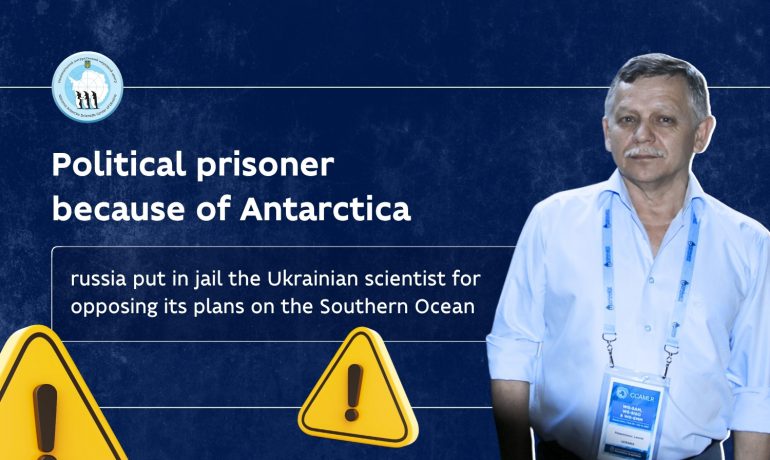In the temporarily occupied Crimea, Russians arrested and accused Ukrainian marine biologist Leonid Pshenichnov of state treason.
He became the first political prisoner in the history of Antarctica for opposing Russia’s overexploitation plans on the Southern Ocean.
The scientist worked for many years at the Southern Research Institute of Marine Fisheries and Oceanography in Kerch. In 2015, he moved to the Institute of Fisheries and Marine Ecology in Berdyansk, and later to its successor, the Institute of Fisheries, Marine Ecology and Oceanography in Kyiv. He continued to live in Crimea with a Ukrainian passport because he was unable to leave his family.
Pshenichnov’s main field of research is the biological resources of the Southern Ocean. The scientist has published many international articles about the assessment of Antarctic krill stocks and the diversity of ichthyofauna.
Given Leonid’s expertise, he was invited to represent Ukraine in the Commission for the Conservation of Antarctic Marine Living Resources (CCAMLR) back in 1996. This organisation is responsible for implementing an ecosystem approach to marine resources to avoid their overexploitation.
In particular, the Commission approves quotas for Antarctic krill and commercial fish species catch and develops measures to protect Antarctic marine living resources. These include, for example, the establishment of marine protected areas — specially protected areas in the Southern Ocean.
Until 2025, Pshenichnov has been actively working in the Commission, officially representing Ukraine. He was the technical coordinator of scientific observation of marine resource catches from aboard our country’s industrial vessels.
The scientist also became one of the authors of the justification for the Ukrainian initiative to establish a new marine protected area (MPA) near the Antarctic Peninsula (not far from the Ukrainian Antarctic base Vernadsky).
Unfortunately, this initiative, like the establishment of any other MPA, has been blocked for years by China and Russia. They not only demand a review of the approaches to planning such areas but also question the feasibility of existing MPAs.
In September 2025, on the eve of the next meeting of the Commission, Ukrainian scientist Leonid Pshenichnov was arrested as a ‘Russian’ (since the Russian authorities forcibly ‘passportised’ the population of occupied Crimea).
He was accused of state treason and causing economic damage to Russia. In particular, the proposal to establish an MPA is seen as putting restrictions on Russian industrial fishing and reducing its control over the strategically important sector of the World Ocean.
‘Let the Russians now try to deny that ecocide is the state policy of the Russian Federation,’ comments Evgen Dykyi, director of the National Antarctic Scientific Centre. “And let them repeat their false song about “Antarctica outside politics” at the Antarctic Treaty Consultative Meetings, which they have been making since 2014 to respond to attempts to draw attention to their war against Ukraine. Unfortunately, Antarctica has not remained outside politics precisely because Russia has brought its policy of ecocide and repression of dissent even there. The ‘Russian world’ is capable of bringing evil even to the icy continent, and even there, this evil must be met with a united international response.”
At this year’s meeting of the Commission, which began recently in Hobart, Australia, Ukraine’s Ambassador to Australia, Vasyl Myroshnychenko, called on the member states to pay attention to the illegal imprisonment of Pshenichnov and asked them to support Ukraine and demand the scientist’s release.
The Australian delegation, the host of the meeting, condemned the arrest of the Ukrainian scientist. The EU and its member states, Norway, the United Kingdom, New Zealand and Korea joined this position.
We ask the global scientific and environmental community to stand up for this Ukrainian researcher of international importance. In 2021, CCAMLR recognised Leonid’s more than 20 years of contribution in its own commemorative materials, and now the scientist is in prison.
Pshenichnov recently turned 70 and has many health problems. Any delay in his release could be critical.


